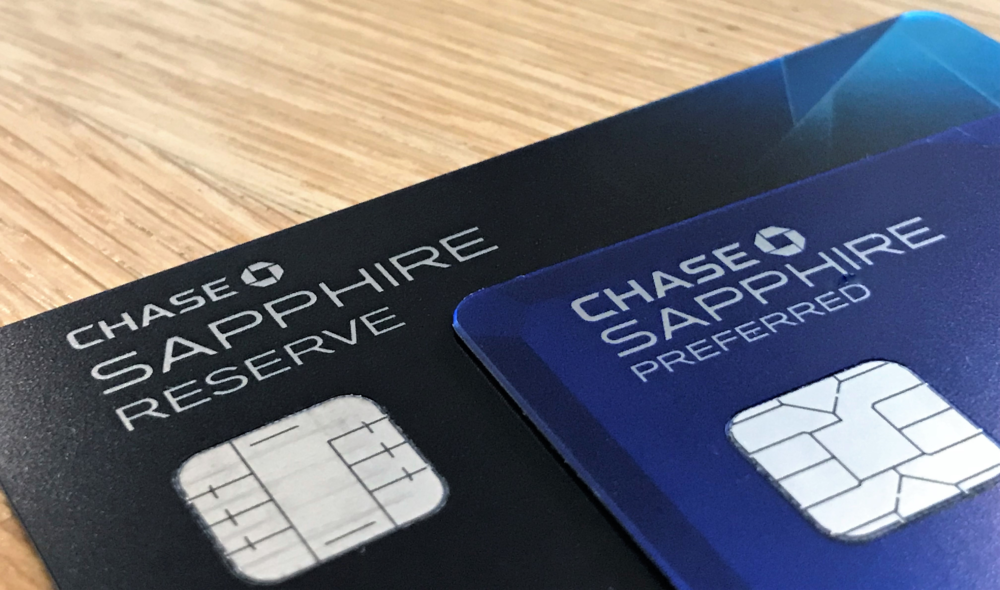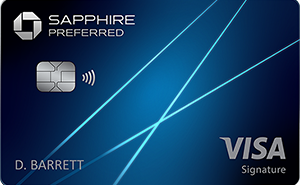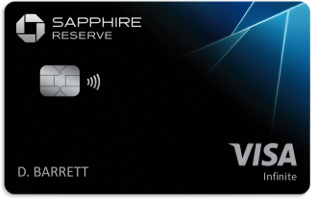If you want the ability to transfer Chase Ultimate Rewards points to hotel and airline partners, you’ll need either the Sapphire Reserve card or the Sapphire Preferred.
Both the cards are currently offering elevated welcome offers, so we thought that it was the ideal time to revive the debate: which one is better? Each card has its own pluses and minuses along with the wildly different annual fees ($550 vs $95). So, in this post, you’ll find a side by side comparison of each card’s benefits, perks and travel & purchase protections in an attempt to help you sort that question out.

Overview
If there is such a thing as a “classic” credit card, the Chase Sapphire Preferred Card (CSP) is it and it’s not hyperbole to say that it changed the world of credit card rewards when it was originally launched in 2009. Not only was it novel for having multiple spending category bonuses, it also offered the ability to earn flexible Chase Ultimate Rewards points, allowing cardholders to transfer earnings to multiple travel partners.
However, when the Sapphire Reserve (CSR) card first debuted several years later, it was clearly a better choice than the Sapphire Preferred for most folks who travel. It sported 3X rewards on travel and dining compared to the Preferred card’s 2X earnings in both categories. The CSR offered (and continues to offer) cardholders 1.5 cents per point value towards travel booked through Chase vs. the 1.25 cents per point that the Preferred card provides. The Reserve also had a slew of benefits not available to Preferred cardholders, among them a Priority Pass membership that included restaurants (unlike the ones that American Express gives its cardholders which only gives access to lounges).
Initially, the Sapphire Reserve cost $450 per year, but the automatic $300 yearly travel credit that the card comes with made it seem more like a $150 card to those of us who easily earned it all without effort. In this light, the $95 Sapphire Preferred card didn’t fare well by comparison. After all, with only a net $55 per year extra, you could get better perks, point earnings and value for the points that you did earn.
Things started changing when Chase increased the Sapphire Reserve annual fee to $550. Now, the Sapphire Reserve is like a $255 per year card after the $300 rebate, making it substantially more expensive than the Sapphire Preferred. First off, the same top notch travel and purchase protections can be had with the Chase Ritz Carlton card, which comes with an annual free night certificate and a lower $450. Then, earlier this year, Chase announced that it was taking away restaurant access from the Priority Pass that comes with the card starting 7/1/24, removing the advantage that it had from the versions provided by Amex and Capital One. In the meantime, Chase increased the Sapphire Preferred card’s dining earning to 3x, equaling the earnings that the Reserve card offers.
Given all these changes, is the Sapphire Reserve still worth the premium? Or, are we now better off with the Sapphire Preferred?
Sapphire Reserve and Preferred Current Welcome Offers
| Card Offer |
|---|
60K Points ⓘ Affiliate 60K after $4K spend in 3 months$95 Annual Fee Alternate Offer: There may be elevated offers available by applying in-branch A similar offer with the first year annual fee waived may be found in-branch. YMMV. |
60K Points ⓘ Affiliate 60K after $4K spend in 3 months$550 Annual Fee Alternate Offer: 70K after $4K spend showing on some accounts when logged-in to Chase Recent better offer: Expired 12/1/22: 80K after $4K spend |
Annual Fee & Statement Credits
| Sapphire Reserve | Sapphire Preferred | |
|---|---|---|
| Annual Fee | $550 | $95 |
| Authorized User Fee | $75 | $0 |
| Annual Travel Rebate | $300 | $50 towards hotels booked through Chase.* |
* While we think it is safe to assume that almost all Sapphire Reserve cardholders will easily earn the $300 travel rebate each year, we don’t expect that all Sapphire Preferred cardholders will spend $50 or more on hotels through the Chase portal in order to get the Sapphire Preferred’s $50 rebate.
Card Perks
Below we’ve listed the perks for each card that we think are the most valuable. For complete details about card perks and more, see our guides to the Chase Sapphire Reserve and Chase Sapphire Preferred.
| Sapphire Reserve | Sapphire Preferred | |
|---|---|---|
| No foreign transaction fees |
Yes | Yes |
| Transfer points to partners: Transfer points 1 to 1 to a variety of airline and hotel programs | Yes | Yes |
| Point value towards travel: When booking travel through Ultimate Rewards, points are worth more than 1 cent each. | 1.5 cents per point | 1.25 cents per point |
| Point earnings for travel spend |
3X | 2X |
| Point earnings for dining spend | 3X | 3X |
| Priority Pass Airport Lounge Access: Free entry for cardholder and up to two guests. As of July 1st, this version no longer includes access to Priority Pass restaurants. | Yes | N/A |
| Global Entry or TSA Pre✔® Fee Credit: Receive a statement credit of up to $100 every 4 years as reimbursement for the Global Entry or TSA Pre Check application fee charged to your card. | Yes | N/A |
Travel Protections
Both the Sapphire Reserve and Sapphire Preferred offer very good protections for travel paid in full or in part with your card. However, the extent of the benefits offered does differ somewhat, with the Sapphire Reserve clearly the better of the two:
| Sapphire Reserve | Sapphire Preferred | |
|---|---|---|
| Primary Car Rental Coverage | Yes | Yes |
| Roadside Assistance | Free 4 times per year | Requires paying fee for each service |
| Trip Cancellation and Interruption Coverage | Up to $20K per trip | Up to $20K per trip |
| Trip Delay Insurance | 6 hour delay | 12 hour delay |
| Lost Luggage |
Yes | Yes |
| Baggage Delay |
Yes | Yes |
| Travel Accident Insurance | Yes | Yes |
| Emergency Evac & Transport | Up to $100K | N/A |
| Emergency Medical & Dental |
Up to $2,500 | N/A |
Purchase Protections
Here’s are the highlights of the purchase protections that both cards offer. Again, the Sapphire Reserve is clearly superior:
| Sapphire Reserve | Sapphire Preferred | |
|---|---|---|
| Extended Warranty: Extends the time period of U.S. manufacturer’s warranty by an additional year, on eligible warranties of three years or less. | Yes | Yes |
| Damage, Theft, Loss Protection: Covers your new purchases for 120 days against damage, theft or accidental loss. | Max $10K per claim | Max $500 per claim |
| Return Protection: You can be reimbursed for eligible items that the store won’t take back within 90 days of purchase. | Max $500 per item, $1,000 per year | N/A |
Chase Sapphire Reserve vs Preferred Summary
| Sapphire Reserve | Sapphire Preferred | |
|---|---|---|
| Annual Fee |
$550 | $95 |
| Authorized User Fee |
$75 | $0 |
| Travel Rebate |
$300 | $50 Hotel |
| Point value towards travel |
1.5 | 1.25 |
| Point earning for travel |
3X | 2X |
| Point earning for dining | 3x | 3x |
| Perks | Better | Limited |
| Travel protection |
Best | Good |
| Purchase protection |
Better | Good |
My Conclusion
I’ve long been a defender of the of the Sapphire Reserve vs the Sapphire Preferred, despite declining enthusiasm for the CSR in the world of points and miles. However, I think that I’ve personally reached a tipping point.
Let’s assume that we value the $300 travel credit at face value (which we probably shouldn’t) and factor in the CSP’s hotel credit at $45, just for convenience’s sake. That would make the yearly difference in annual fee between the two cards ~$200.
The travel and purchase protections on the Reserve are great, but I can have them with the better-value Ritz Carlton card for $100 less per year, along with the same (and soon-to-be-pedestrian) Priority Pass. That leaves the 3x earning on travel and 1.5 cents per point redemption through Chase Travel as the primary advantages that it has over the Preferred.
In order to break even on the additional $200 that I’m spending each year, I’d have to redeem ~80,000 points annually on travel through the Chase Portal.
Conversely, we value Chase Ultimate Rewards at ~1.55 each. Using that (admittedly conservative) number, I’d have to spend ~$13,000 on travel using the card each year to earn enough points at 3x to offset $200.
Spoiler Alert: I don’t do either one of those enough for the CSR to make sense for me.
I’ve been a Sapphire Reserve cardholder for years, but no more. I just don’t see the (significant) benefits of the card outweighing the $550 annual fee any longer when I compare it with the $95 Sapphire Preferred (or the $95 Ink Business Preferred). I’m out.
There could still be some folks for whom the Sapphire Reserve makes sense; it can be a very valuable card. People who spend a lot on cash travel (and want to earn Ultimate Rewards vs another transferable currency), redeem a bunch of points every year through Chase Travel or who don’t want or can’t get the Ritz Carlton card but still want terrific travel protections may all reach a different conclusion.
All that said, it’s worth trying to suss out exactly how much these benefits are worth to you before you decide whether or not to plunk down the rather significant additional cash on the Sapphire Reserve over the Sapphire Preferred.







[…] Chase Sapphire Reserve vs Chase Sapphire Preferred: Which Is Right For You? […]
[…] NEW: Chase Sapphire Reserve vs Chase Sapphire Preferred: Which Is Right For You? […]
Usually can use the $5 monthly Door Dash (coupon book) credit since it will rollover for 3 months max. That’s another $60 off of Reserve, (assuming it continues past December 2024)
Having good lounge options in both JFK and LGA has been valuable to me, especially as I would not usually have a ticket with lounge access at all at LGA, and at JFK it’s infinitely better than the Maharajah Lounge that Singapore uses. I travel frequently enough that it tips the scales.
Visited Sapphire lounge in Boston through my once a year priority pass perk, very impressed. If you fly and have a sapphire lounge, it is a no brainer. Loved someone bringing food and drinks to me.
For active military personnel the CSR is a much better option since the fee is waived. Given that cobranded cards do not have the fee waived I’ll stick with the CSR as my main Chase card. I will reevaluate once I leave the service or Chase changes their policy.
Easy decision. USBAR & CSP is what I’ve settled on. I get the same purchasing power as the CSR with the Altitude Reserve, but can book travel anywhere and redeem it instantly through RTR. Still have access to transfer partners, superior earning multipliers where it counts (groceries & dining), and effectively 3x everywhere. Although the PP access on the Altitude Reserve is limited, the CSR is really $325/yr since I have to add AU for $75 just to get my family of six in the lounge. That doesn’t make much sense for only a thrice-yearly opportunity.
We take family road trips semi regularly, and the 3x toward car rentals, comprehensive car coverage, and 1.5cpp redemption via Costco Travel is a win. I reasoned that the net annual fee of $95 for both cards after all credits yet having the core useful benefits of the CSR is best.
($400 + $95 annual fees) – ($325 travel credit + $50 hotel credit + $100/4 Global Entry credit)
($495 annual fee – $400 credits) = $95 FTW
This is my Tier 1 combo, as well. I love the USBAR due to its flexibility in allowing the purchase of certain travel how I want and I value Chase for its point multipliers and transfer partners (for my family’s needs).
I will be replacing the CSP with the Ink Preferred soon, though.
I have the CSR since 2016. I’m seeing less value in keeping it lately, and this updated article kind of pushing me towards the edge. I’m due for renewal in August, and I may pull the trigger and switch to CSP.
The only question is, since it’s a 8 year old card (one of my oldest), canceling the card and applying for a CSP will hit my credit a bit.. CSP’s signup bonus worth that hit?
Downgrade your CSR to a Freedom Product and wait at least two weeks and apply to the CSP (currently with elevated offer).
I’m due for CSR renewal in August, feels like I should use CSR until that and then downgrade, no?
Do you think CSP elevated offer worths downgrading CSR a few months early?
We’ve had the CSR for a while now and are in the same position. We’re going to product-change to the Freedom Unlimited. But, honestly, Chase’s ecosystem has become unremarkable save for the Ink SUBs. (And, I’m not a Hyatt guy.)
The big argument for the CSR (or the Ritz Carlton) is the travel protections. But, consider that with the Amex Platinum you’d be earning 5X on airfare and hotels. Or, with the WF Autograph Journey, you’d be earning 4X on airfare and 5X on hotels.
Assuming you have a premium card because you have a healthy amount of travel spending, the value of the extra points would more than offset the cost of standalone travel insurance. Allianz has annual policies that offer comparable coverage for roughly $300 to $500.
Saving the CSR’s net annual fee of $250 would be gravy on top of the value of the extra points. Hope this helps your deliberations.
PS – “Uncle” Nick expects WF to expand its list of transfer partners.
Very good explanation, but I’m confused, you started like suggesting dropping CSR, but ended favoring keeping it?
Just downgrade CSR to a Freedom. Then apply for CSP
Another reason to get the CSR is if you live in a city with a Sapphire lounge or frequently travel somewhere that has one. I’m writing this from the Club in Boston. Wishing that I was in the Sapphire Lounge… Haha.
Currently have CSR, Flex and Unlimited. Thinking about applying for the Ink Preferred and then cancelling CSR. Ultimately might get Sapphire Preferred in the future. I also have a Bonvoy Bold that I might try to upgrade to Ritz.
The PP lounges just aren’t worth it. So many times they are packed (especially in Mexico) and you can’t even find a place to sit. The ones in HNL are terrible.
CSR’s Instacart and DoorDash benefits keep me around, so I hope Chase maintains those before my renewal.
The $300 travel credit should never be valued at $300 face value because Chase stopped awarding points on that $300 worth of purchases long ago. So $300*3 points/$ * $0.015/cpp = $13.50 loss. The $300 is worth at best $286.50 and then deduct from there what you think prepaid travel credits are worth.
Likewise, when compared to how other issues handle points redemptions, it’s hard to value UR at $0.015 for cash redemptions since, again, you don’t earn points on those bookings. Compare this to the USBAR.
$1000 booking with UR = 66,667 UR needed.
$1000 booking with AR = 66,667 AR needed but then you earn back 3000 points on the booking so it really costs 63,667 net. Plus if you booked the hotel direct you’re getting your hotel points or you could have booked through a discount portal.
The fee increase made that decision easy for me. Recently, I had been considering upgrading back to CSR but concluded against it. P2 and I are flush with UR after saving up in anticipation of Hyatt’s ultimately botched Mr and Mrs Smith deal, so for the first time I was considering Chase Travel bookings with points. I thought the extra 0.25 cents/point could make it palatable for the right redemption. Unfortunately, Chase Travel is garbage. Hotel selection is limited and normally more expensive (often much more!) than other booking options. And when considering portal and cc earnings rates, even when Chase Travel has competitive pricing it cuts the redemption well below 1.5.
Fortunately received 150$ statement credit when I asked for retention offer. Most likely will keep it for another year
The main CSP / CSR difference for me is the CSR’s ability to cash out at 1.25 cpp on gas purchases.
How many UR are you cashing out every year? With a ~$200 difference in AF, you’d need to cash out 80k+ every year just to break even.
That’s a good point. In fact if cash is king downgrade all the way to Freedom Flex and save $250 in AF. Then need to cash out 100k+ on CSR to break even.